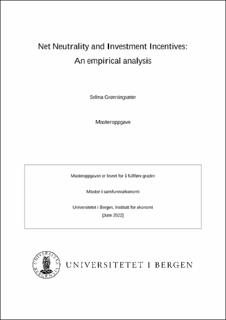Net Neutrality and Investment Incentives: An empirical analysis
Master thesis
Permanent lenke
https://hdl.handle.net/11250/2999907Utgivelsesdato
2022-06-01Metadata
Vis full innførselSamlinger
- Master theses [120]
Sammendrag
This thesis looks at the effect that the removal of Title II regulations on the Internet service providers under the Restoring Internet Freedom Order of 2018 had on Internet service provider’s incentives to invest in their capacity. I have found that contrary to the arguments used by the FCC (2018) in their choice to remove the regulations that there was no evidence that the removal has caused an increase in investment. Instead, using a difference-in-difference method and by using European Internet service providers as the counterfactual control group, I found that investment has decreased following the net neutrality removal. This thesis looks at the capital expenditure by the Internet service providers over the period of 2004-2020, but the data sample only includes annual data points which is a weakness of this analysis and means that any effect found might be over- or underestimated. Because of this, this thesis will also be using Choi and Kim’s (2010) model that examines the effect of net neutrality on investment incentives. By using their model, I argue that the reason for the fall in investment might have been caused by the effect that any increase in speed will lower the content provider’s willingness to pay to achieve first priority on the delivery of their content as well as an effect of increased content request rate, high bargaining power for the Internet service provider and low product differentiation. But I can not say anything about the strength of these effects.
